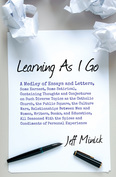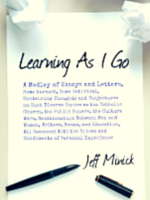
Uncle Sam and I have been friends for a long time. Unfortunately, he was forced into a reclusive early "retirement," but when I saw him last he reminded me of something I'll never forget: Mr. Government doesn't own America--we do.
The government is the only thing we all belong to.
—Democratic National Convention, 2012
The line above appeared in a video shown to Democrats at their national convention in Charlotte. It provoked support from Democrats and some small outrage from their opponents. In my own case, this statement gave rise to a question I had never before considered: To whom or to what do I belong?
As an adult, I have never considered myself much of a joiner. My tendency to shy away from groups, I must add, I regard more as a personal failing and detriment than a sign of independence. I envy certain people their social ease and their many friendships. I may “play well with others,” as a kindergarten teacher might write, but it’s too often forced and bumbling play at best.
After duly contemplating the matter, I discovered that certain agents and agencies can indeed claim me for their own. Here is a short list of some of those claimants:
I belong to God. My faith insists that I am a son of God, a brother to Christ, a servant of both. My performance in these roles may not win me any Oscars, but nonetheless there I am, mucking along with what Flannery O’Connor in her short story “Revelation” called “a vast horde of souls.”
I belong to the human race. This same dictate of biology has also rendered me a Caucasian male. Whatever I think of these determinations is immaterial. Here I stand: Homo sapiens, white, a guy.
I belong to my ancestors. A myriad of physical unions down through the ages brought me into being, endowed me with my genetic code, made me who I am. Most particularly, I belong to my parents, who not only thrust upon me the make-up of my DNA but forged as well my personality.
I belong to my wife Kris. We brought children into the world, jointly owned several businesses, lived, loved, and suffered together. If marriage is the joining of two into one, then I must count myself as belonging to a woman who died eight years ago and whom I see now only in my dreams.
I belong to my children. They are, after all, flesh of my flesh: they belong to me and I to them like nothing else in this world.
I belong to my past. This past, my past, all that I have done, seen, touched, influenced, all that I remember and even those things which I do not remember: all are a part of me. My past cannot be abandoned or eradicated; it belongs to me, and I to it.
I belong to my work. I have mingled my labor and talents with people and objects outside of myself and so belong in some way to those people and objects. Currently, I belong to my writing and to my students. (Some of my students may be surprised to learn that I regard myself as belonging to them. This revelation surprised—and pleased—me as well).
Throughout my life I have belonged voluntarily to various groups. These organizations range from the Boy Scouts to sports teams, from political organizations to book clubs. Some of the claims laid on me by my voluntary submissions are profound, some trite. I belong, for example, to the Catholic Church, which I entered at age forty-one. Here my belonging entails enormous consequences and demands. At the opposite extreme, I belong to the Intercollegiate Studies Institute, which means I receive an occasional notification of the institute’s activities and a discount on certain books published by the organization.
These are a few of the claimants that possess me in some way, that can legitimately be regarded as owners great and small of my self. But what I have never belonged to, what I do not belong to, and what I will never belong to is the government.
The nincompoop who concocted the idea that the government is the only thing we all belong to has turned the American ideal on its head. In America we don’t belong to the government. The government belongs to us. All of those who work in government—the president, the members of Congress, the governors, the millions of bureaucrats—work for people like me. I pay them money through taxes, and though they may in our present confusion consider me their slave, it is nonetheless the master who pays the servant.
I love my country and owe a great debt to its founders and to those who over the years have protected its ideals, but those who would wish me to belong to the government betray those ideals. They would ask me to exchange my liberty for base servitude. Such servitude violates the natural rights of the human being—rights like life, liberty, and the pursuit of happiness.
No government may grant us these rights. They belong to us by virtue of our birth and our human personhood. Whether I pay taxes or receive government stipends, that government which insists that I “belong to it” strips me of my rights and makes me a slave.
Communists, socialists, and fascists belong to their governments. The daughters and sons of Locke, Jefferson, and Adams belong to liberty.
—Democratic National Convention, 2012
The line above appeared in a video shown to Democrats at their national convention in Charlotte. It provoked support from Democrats and some small outrage from their opponents. In my own case, this statement gave rise to a question I had never before considered: To whom or to what do I belong?
As an adult, I have never considered myself much of a joiner. My tendency to shy away from groups, I must add, I regard more as a personal failing and detriment than a sign of independence. I envy certain people their social ease and their many friendships. I may “play well with others,” as a kindergarten teacher might write, but it’s too often forced and bumbling play at best.
After duly contemplating the matter, I discovered that certain agents and agencies can indeed claim me for their own. Here is a short list of some of those claimants:
I belong to God. My faith insists that I am a son of God, a brother to Christ, a servant of both. My performance in these roles may not win me any Oscars, but nonetheless there I am, mucking along with what Flannery O’Connor in her short story “Revelation” called “a vast horde of souls.”
I belong to the human race. This same dictate of biology has also rendered me a Caucasian male. Whatever I think of these determinations is immaterial. Here I stand: Homo sapiens, white, a guy.
I belong to my ancestors. A myriad of physical unions down through the ages brought me into being, endowed me with my genetic code, made me who I am. Most particularly, I belong to my parents, who not only thrust upon me the make-up of my DNA but forged as well my personality.
I belong to my wife Kris. We brought children into the world, jointly owned several businesses, lived, loved, and suffered together. If marriage is the joining of two into one, then I must count myself as belonging to a woman who died eight years ago and whom I see now only in my dreams.
I belong to my children. They are, after all, flesh of my flesh: they belong to me and I to them like nothing else in this world.
I belong to my past. This past, my past, all that I have done, seen, touched, influenced, all that I remember and even those things which I do not remember: all are a part of me. My past cannot be abandoned or eradicated; it belongs to me, and I to it.
I belong to my work. I have mingled my labor and talents with people and objects outside of myself and so belong in some way to those people and objects. Currently, I belong to my writing and to my students. (Some of my students may be surprised to learn that I regard myself as belonging to them. This revelation surprised—and pleased—me as well).
Throughout my life I have belonged voluntarily to various groups. These organizations range from the Boy Scouts to sports teams, from political organizations to book clubs. Some of the claims laid on me by my voluntary submissions are profound, some trite. I belong, for example, to the Catholic Church, which I entered at age forty-one. Here my belonging entails enormous consequences and demands. At the opposite extreme, I belong to the Intercollegiate Studies Institute, which means I receive an occasional notification of the institute’s activities and a discount on certain books published by the organization.
These are a few of the claimants that possess me in some way, that can legitimately be regarded as owners great and small of my self. But what I have never belonged to, what I do not belong to, and what I will never belong to is the government.
The nincompoop who concocted the idea that the government is the only thing we all belong to has turned the American ideal on its head. In America we don’t belong to the government. The government belongs to us. All of those who work in government—the president, the members of Congress, the governors, the millions of bureaucrats—work for people like me. I pay them money through taxes, and though they may in our present confusion consider me their slave, it is nonetheless the master who pays the servant.
I love my country and owe a great debt to its founders and to those who over the years have protected its ideals, but those who would wish me to belong to the government betray those ideals. They would ask me to exchange my liberty for base servitude. Such servitude violates the natural rights of the human being—rights like life, liberty, and the pursuit of happiness.
No government may grant us these rights. They belong to us by virtue of our birth and our human personhood. Whether I pay taxes or receive government stipends, that government which insists that I “belong to it” strips me of my rights and makes me a slave.
Communists, socialists, and fascists belong to their governments. The daughters and sons of Locke, Jefferson, and Adams belong to liberty.







 RSS Feed
RSS Feed